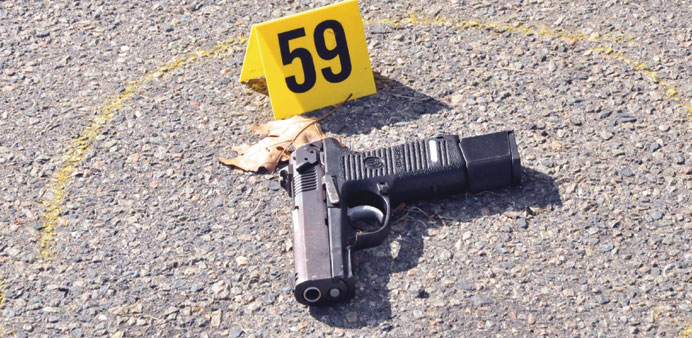This handout image presented to jurors yesterday in Boston, Massachusetts, shows a 9mm Ruger P95 pistol entered as evidence in the Boston Marathon bombing trial. The gun was used to kill MIT police officer Sean Collier and was found at the scene in Watertown, Massaschusetts, along with a box of ammunition.
Reuters/Boston
The Boston Marathon bombing jury yesterday saw evidence including a fuse and a piece of a pressure-cooker lid seized at the apartment where accused bomber Dzhokhar Tsarnaev and his brother lived.
A Federal Bureau of Investigation special agent described sorting through a debris-filled room that was “like a construction site” in the Tsarnaevs’ cramped three-bedroom apartment in Cambridge, Massachusetts, just outside Boston, four days after the deadly bombing on April 15, 2013.
“It almost looked like a construction site. There were tools in there, lots of debris,” testified FBI special agent Christopher Derks, who led the apartment search.
The jury also saw a jar filled with nails, a pellet gun and shooting targets and a black flag with Arabic writing that hung on the apartment’s wall, all seized by agents.
Dzhokhar Tsarnaev, 21, is accused of killing three people and injuring 264 with a pair of homemade pressure-cooker bombs packed with nails and BB pellets at the race’s crowded finish line. He is also charged with fatally shooting a police officer three days later as he and his 26-year-old brother Tamerlan tried to flee. Tamerlan died hours after the shooting, following a gunfight with police in Watertown, Massachusetts.
Tsarnaev’s lawyers opened the trial early this month by bluntly admitting their client committed all the crimes of which he is charged. They contended, however, that Tamerlan was the driving force behind the attack, with Dzhokhar going along out of a sense of subservience. The lawyers want to persuade the jury to spare him the death penalty.
Witnesses this week have detailed “jihadist” writings found on Tsarnaev’s computers and evidence related to a trip to a New Hampshire shooting range a month before the attack as signs that he was a motivated and willing participant.
Kimberly Franks, a supervisory agent with the FBI, testified that investigators who searched Tsarnaev’s dorm room at the University of Massachusetts at Dartmouth found a large fireworks device labelled “Big Snow.”
Prosecutors contend the Tsarnaev brothers filled their homemade bombs with black powder removed from fireworks purchased legally in New Hampshire.
A photo of a similar firework, with its powder removed, that was retrieved from a backpack found at a landfill south of Boston was also shown to the jury. FBI Special Agent Kenneth Benton testified that he and fellow agents searched the landfill after a college friend of Tsarnaev’s took the plaid backpack from the defendant’s dorm room and later tossed it into a dumpster.
Two Kazakh exchange students were charged with obstruction of justice for removing that backpack from Tsarnaev’s room on April 18, 2013, after the FBI released photos of the brothers identifying them as suspects in the bombing.
Exchange student Azamat Tazhayakov in July was found guilty of obstructing justice for taking the backpack and his friend Dias Kadyrbayev in August pleaded guilty to the same charge.
The bombing killed restaurant manager Krystle Campbell, 29, graduate student Lingzi Lu, 23, and eight-year-old Martin Richard. Tsarnaev is also charged with the fatal shooting of Massachusetts Institute of Technology police officer Sean Collier three days after the bombing.

